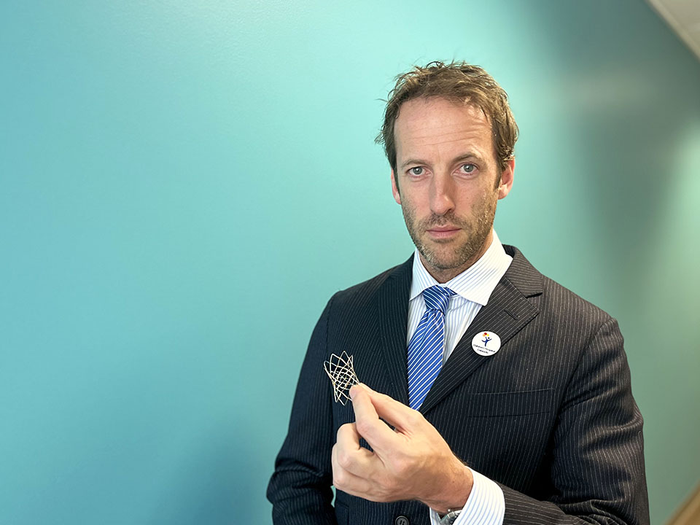Aurora, Colo. (May 18, 2022) – Children’s Hospital Colorado (Children’s Colorado) is the first hospital in the world to implant the newly FDA-approved G-Armor Stent. Although the stent is designed to be used in the smallest of patients, it was first implanted in a Colorado father of two. The stent was developed by interventional cardiologist, Gareth Morgan, MD, who oversees the Interventional Congenital Cardiology program at Children’s Colorado in conjunction with NuMed for Children.

Credit: Children’s Hospital Colorado
Aurora, Colo. (May 18, 2022) – Children’s Hospital Colorado (Children’s Colorado) is the first hospital in the world to implant the newly FDA-approved G-Armor Stent. Although the stent is designed to be used in the smallest of patients, it was first implanted in a Colorado father of two. The stent was developed by interventional cardiologist, Gareth Morgan, MD, who oversees the Interventional Congenital Cardiology program at Children’s Colorado in conjunction with NuMed for Children.
Unlike many other stents, the G-Armor is hand-manufactured with considerable capacity for expansion and minimal shortening during implantation. The result is a stent that can be dilated to accommodate a patient’s natural growth, potentially reducing the need for additional stent implantation – a key benefit to growing pediatric patients. The high expansion range also provides cardiac interventionalists the ability to treat a broader range of patients.
“I am proud to have led the development of the first custom stent approved by the FDA in a decade to treat congenital heart disease,” says Morgan, who is also an associate professor at the University of Colorado School of Medicine. “This new stent, in combination with our unmatched imaging technologies, removes significant surgical uncertainties, and is expected to result in improved outcomes for patients of all ages.”
The first patient was Randy Welch, who was told as a child that the small hole in his heart would close. But as a new dad working at the National Institutes of Health in Maryland, Welch learned the hole had expanded significantly and was causing his heart to pump extremely hard, which could ultimately result in heart failure. After moving back to Colorado and seeking cardiology care, Welch was quickly referred to Joseph Kay, MD, program director for the Children’s Colorado / UCHealth Adult Congenital Heart Disease program. This unique program on the Anschutz Medical Campus specializes in treating adults, like Welch, who were born with congenital heart defects.
Welch’s two options were either open heart surgery or implanting this new stent in the Children’s Colorado heart catheterization lab. With a second child on the way, Welch wanted the procedure with the lowest risk and quickest recovery time. Working with his colleague Jenny Zablah, MD, who leads the innovative interventional imaging team, Dr. Morgan created a 3D model of Welch’s heart and determined that Welch was a good candidate for the new stent.
Like many young adults with congenital heart disease, Dr. Kay and Dr. Morgan deemed that Welch’s procedure and recovery would be best managed by the congenital cardiac team at Children’s Colorado to take advantage of the hospital’s high-end imaging technologies, virtual-reality planning and the extensive experience of the entire catheterization lab team.
“Working in the medical field, I understood I needed to repair my heart, but I kept putting it off. The thought of having open-heart surgery with two babies at home wasn’t very appealing,” said Welch. “But Dr. Morgan and Dr. Kay explained how left untreated, I could go into heart failure or have a stroke. The new stent was a perfect option for me.”
Six months after surgery, Randy is feeling good, his heart looks great and his future is bright.




